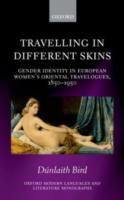D?nlaith Bird argues that vagabondage - a physical and textual elaboration of gender identity in motion - emerges as a totemic concept in European women's travel writing from 1850. For travellers including Olympe Audouard, Isabella Bird, Isabelle Eberhardt, and Freya Stark,vagabondage is a means of pushing out the physical, geographical, and textual parameters by which 'women' are defined.Travelling in Different Skins explores the negotiations of European women travel writers from 1850-1950 within the traditionally male-oriented discourses of colonialism and Orientalism. Moving from historical overview to close textual reading, it traces a complex web of tacit collusion and gleeful defiance. These women improvise access to the highly gendered 'imaginative geography' of the Orient. Tactics including cross-dressing, commerciality, and the effacement of their male companions are used to carve out a space for their unconventional and often sexually-hybrid constructions.Using a composite theoretical basis of the later critical work of Judith Butler and Edward Said, this comparative study of British and French colonial empires and gender norms draws out the nuances in these travellers' constructions of gender identity. Women travel writers are shown to play an important role in the legacy of sexual experimentation and self-creation in the Orient, traditionally associated with male writers including Gide and Pierre Loti, and now ripe for critical re-evaluation. This study demonstrates how these women use lived experiences of restriction and negotiation to elaborate advanced theories of motion and gender construction, presaging the concerns of twenty-first century feminism and post-colonialism.

